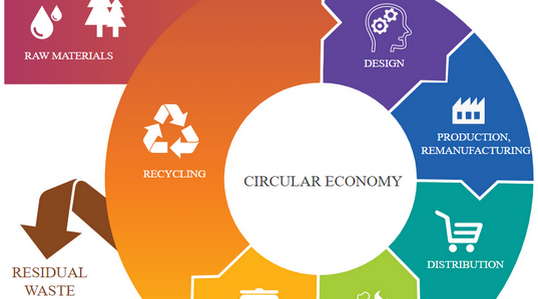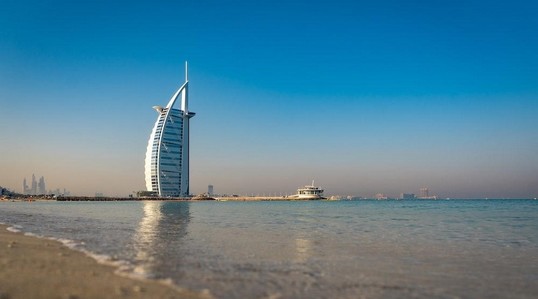5 Economic Benefits of a Circular Economy
Introduction
In 2023, most UAE residents and businesses are unfamiliar with the concept of the circular economy model. Simply put, a circular economy is where resources are reused and recycled instead of being discarded as waste in landfills, oceans, and other places.
The core purpose of transitioning from the traditional linear model to a circular one is to reduce environmental degradation and create a sustainable future for the coming generations. However, you would be surprised by the number of ways a circular economy can help countries like the UAE other than reducing greenhouse emissions, pollution, and waste.
In this post, we’ll share the five key benefits of a circular economy so you can adopt some of the principles and lead a more sustainable lifestyle. However, before diving right into them, we’ll share a brief overview of what a circular economy looks like.
Circular Economy Explained

As mentioned earlier, a circular economy mandates using and reusing resources to minimize waste and pollution. It aims to enable a natural cycle like photosynthesis and energy conservation for industrial processes. For example, crops grow with the aid of sunlight, water, and nutrients. Once fully grown, they’re consumed, and the nutrients are transferred back to the soil.
Currently, most societies employ a linear approach to resource extraction and utilization/consumption. We make products and throw them away at the end of their lifecycle. This practice results in excessive resource depletion and environmental degradation, both major socio economic issues that must be addressed soon.
Let’s take the example of a laptop, a device used for work applications and entertainment. Below is a typical lifecycle of a laptop from production to end-of-life:
- Extraction – Laptops are built using several components made from metals and minerals like lithium, cobalt, copper, etc. The demand for portable devices rises each year, resulting in a massive strain on the mining industry to produce sufficient raw materials. Since 2020, there’s been a global shortage of chip storage due to the additional stress on the already stretched industry.
- Production – Like any other electronic device, laptops require energy and resources for parts production and assembly.
- Supply – Laptops are shipped to different parts of the world in ships, trucks, trains, and other modes of transport that mostly burn fossil fuels.
- Consumption – According to Business News Daily, the average lifespan of a typical laptop is two to three years. Many users, especially in developed countries like the United Arab Emirates, upgrade to newer models quickly.
- Disposal – Unfortunately, less than 15% of electronics are recycled properly. More importantly, most old and damaged laptops are sent directly to landfills without any of their working parts being salvaged.
As you can see, the linear economy model is incredibly destructive. Therefore, many companies and societies are looking to close the loop in their production and supply chain to minimize waste and extend the lifespan of precious resources as much as possible.
The 5 Key Economic Benefits of a Circular Economy

Below are the five key economic benefits of a circular economy for countries like the United Arab Emirates:
1. Economic Prosperity
According to a study by Accenture, the circular economy could increase global revenue by up to $4.5 trillion, with the majority of the profit shares going to countries with the best circular model transitions. As more industries strive to improve operational efficiency and introduce more innovative solutions, the business landscape will unlock more opportunities for growth and expansion.
From a governance perspective, it will also result in more tax revenue with more systems being centralized and integrated through sharing platforms and connected infrastructures. This way, a circular economy conserves more energy and produces less waste.
2. Reduced Unemployment
As more people venture into industries and niches based on a circular model, we could see a massive drop in unemployment rates worldwide with millions of new jobs. A circular economy will also balance the pay gap between traditional jobs and diversify the market with more young professionals seeking careers in recycling, remanufacturing, green marketing, agritech, and waste management.
3. Land Protection and Productivity Enhancement
In small countries like the United Arab Emirates, land is one of the most precious commodities. According to a study, the linear economy is one of the biggest reasons for land degradation, especially in rural areas with farms and food processing plants.
By adopting a circular model, owners can protect and enhance land productivity by maintaining soil health with better recycling and waste collection and disposal practices.
4. Increased Product Safety
Traditional manufacturing processes mandate using harmful chemicals and toxins to make products to improve cost savings and ease of production. However, most of these chemicals end up in the soil, oceans, food/water supply, and other places where they can easily harm humans, plants, and animals.
The circular economy model aims to do more than utilize recycled materials. It also ensures these materials are free of harmful chemicals and toxins, so they don’t harm our health or the environment.
5. Business Continuity Enhancement
Finally, the fifth economic benefit of a circular economy is improved business continuity and bottom line. Businesses that switch to circular models can reduce their reliance on virgin raw materials and save thousands or millions yearly on recycling and remanufacturing.
With this approach, they can also reduce their vulnerability to volatile market prices or supply chain disruptions. In short, businesses with a circular model are more resilient and better positioned to remain competitive and profitable in the long run.
Conclusion
At RECAPP, we believe a circular economy is a game-changing solution that can help UAE residents and businesses build a more sustainable future. It can solve several problems at a macroeconomic scale, including climate change, financial disparity, and resource depletion.
We aim to play a role in this major circular transition by providing a recyclables collection service to reduce and prevent waste from entering UAE landfills and water bodies. You, too, can get on board the change wagon and leave our planet in a better state for future generations by learning and reaping the economic benefits of a circular economy.
